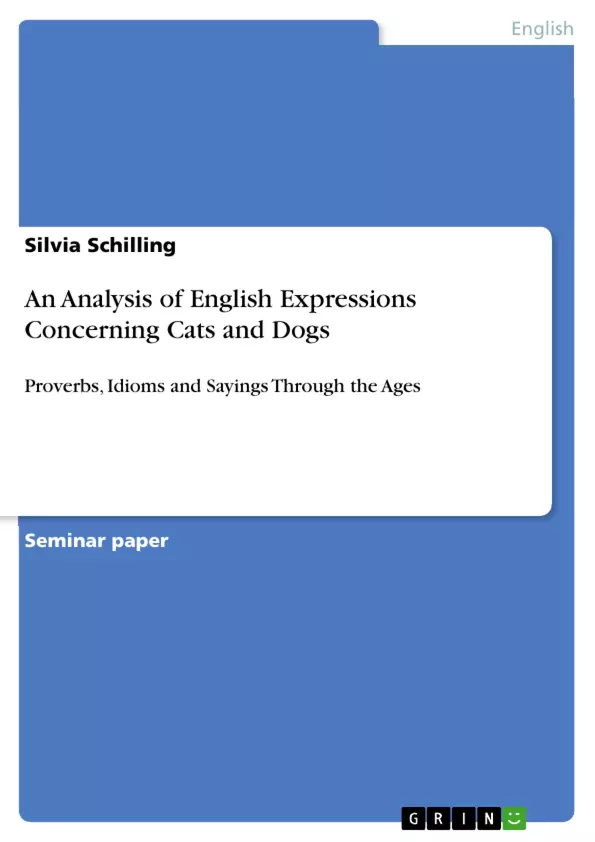15 different proverbs, idioms and sayings about cats and/or dogs are discussed in this essay, such as "It is raining cats and dogs". These expressions are examined in chronological order, starting with those which emerged in the Middle English Period and ending with those which have their origins in the Modern English Period. In addition to a short overview of different linguistic periods, each phrase is discussed in detail. For each expression, details like their first appearance in literature, origin stories and their meaning(s) are presented.
Inhaltsverzeichnis (Table of Contents)
- Introduction
- Expressions Recorded in the Middle English Period (1100-1450)
- To bell the cat
- Let sleeping dogs lie
- A living dog is better than a dead lion
- Expressions Recorded in the Early Modern English Period (1450-1750)
- Love me, love my dog
- Dog does not eat dog
- A cat has nine lives
- A cat may look at a king
- Dog days
- Dogs of war
- It is raining cats and dogs
- Like a cat on hot bricks
- Give a dog a bad name and hang him
- Expressions Recorded in the Modern English Period (1750-1950)
- To let the cat out of the bag
- The hair of the dog that bit you
- To grin like a Cheshire cat
Zielsetzung und Themenschwerpunkte (Objectives and Key Themes)
This essay discusses a selection of English idioms and proverbs involving cats and dogs, analyzing their origins and meanings. It examines how these expressions reflect the historical context of their creation and usage, illustrating the cultural and social significance of these animals throughout different periods of the English language.
- Historical Development of English Idioms and Proverbs
- Cultural and Social Connotations of Cats and Dogs
- Evolution of Language and its Relationship to Social Change
- Analysis of the Historical Context of Idioms and Proverbs
- The Impact of Literature on the Development of English Idioms and Proverbs
Zusammenfassung der Kapitel (Chapter Summaries)
The first chapter, "Expressions Recorded in the Middle English Period (1100-1450)", examines three proverbs, “To bell the cat”, "Let sleeping dogs lie" and "A living dog is better than a dead lion", tracing their origins and development in the Middle English period.
The second chapter, "Expressions Recorded in the Early Modern English Period (1450-1750)", delves into nine expressions, highlighting their usage and significance in the Early Modern English period.
The third chapter, "Expressions Recorded in the Modern English Period (1750-1950)", focuses on three idioms, "To let the cat out of the bag", "The hair of the dog that bit you", and "To grin like a Cheshire cat", exploring their origins and their relevance to the Modern English period.
Schlüsselwörter (Keywords)
The core keywords and topics of this essay include English idioms, proverbs, sayings, historical linguistics, Middle English, Early Modern English, Modern English, cats, dogs, cultural significance, social change, and literary influence.
Frequently Asked Questions
What is the origin of the expression "It is raining cats and dogs"?
The essay discusses the origins of this Early Modern English expression (1450-1750), exploring various theories and its first appearances in literature.
Which cat and dog idioms date back to the Middle English Period?
Expressions like "To bell the cat", "Let sleeping dogs lie", and "A living dog is better than a dead lion" were recorded between 1100 and 1450.
What does "To grin like a Cheshire cat" mean and where did it come from?
Originating in the Modern English Period (1750-1950), this idiom refers to a wide, self-satisfied smile, famously popularized by Lewis Carroll's literature.
What are "Dog days" and when was the term first used?
"Dog days" refers to the hottest period of summer. It is an Early Modern English expression rooted in ancient astronomical beliefs regarding the Dog Star, Sirius.
How do these idioms reflect cultural history?
The analysis shows how the usage of cats and dogs in language reflects social changes, literary influences, and the changing status of these animals in English society over centuries.
- Citation du texte
- Silvia Schilling (Auteur), 2018, An Analysis of English Expressions Concerning Cats and Dogs, Munich, GRIN Verlag, https://www.grin.com/document/520593



